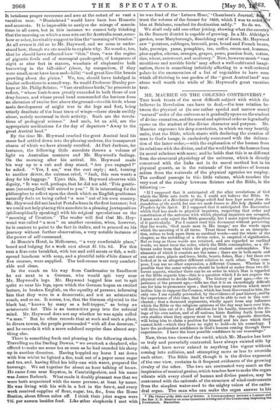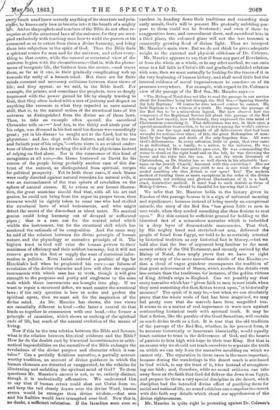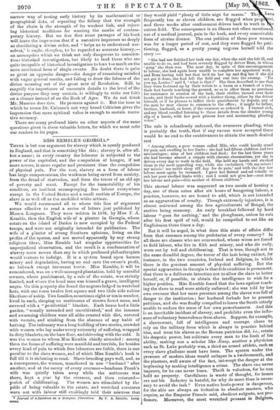MR. MAURICE ON THE COLENSO CONTROVERSY.* THIS book treats of
the most difficult subject with which the believer in Revelation can have to deal,—the true relation be- tween the physical or (in one rather special and narrow sense) "natural" order of the universe as it gradually opens on the student of divine causation, and the moral and spiritual order as it gradually opens on the student of the divine character and purpose. Mr. Maurice expresses his deep conviction, in which we very heartily unite, that the Bible, which starts with declaring the creation of man in God's image, is exclusively concerned with the delinea- tion of the latter order,—with the explanation of the human from its relations with the divine, and of the world below the human from its moral relations with man; and he holds that this is as different from the structural physiology of the universe, which is directly concerned with the links not in its moral method but in its physical growth, as is the rationale of the motives of human action from the rationale of the physical agencies we employ. The cardinal passage in this little volume, which touches the very root of the rivalry between Science and the Bible, is the following :—
" If I supposed that it anticipated all the after revelations of God which the Bible sets forth to us, I could not believe the Bible. St Paul speaks of a Revelation of things which had been kept secret from the foundation of the world, but now are made known to His holy Apostles and Prophets by the Spirit. If I supposed that it anticipated the discoveries which God has made to physical inquirers, respecting that order and constitution of the universe with which physical inquirers are occupied, I must not only reject the Bible generally, but I must reject this portion of it particularly. For I cannot read this document without perceiving that the words, God made man in His image,' are the words upon which the meaning of it all turns. Treat those words as an interpola- tion, refuse to look upon them as cardinal words—and the whole of the chapter, as the unfolding of a divine order, is emptied of signification. But so long as these words are retained, and are regarded as cardinal words, we must treat the order, which the Bible contemplates, as a dif- ferent order from that which the physical student contemplates. The elements of which it consists are the same ; there are in both earth and sun and stars, plants and trees, birds, beasts, fishes, Maim; but these are looked at in an altogether different relation to each other. They com- pose, I can use no other expression, a different Cosmos. Whether it is possible that the same subjects should be looked at under these two dif- ferent aspects, whether there can be an order in which Man is regarded as the Bible regards him—this is a question which I do not require the physical student to decide hastily. The history of past ages,—the ex- perience of the present age,—tells me that it is an exceedingly difficult one for him to pronounce upon ; that he has many motives which must incline him to suppose the Cosmos, which has been discovered to him, the only one. I am equally persuaded, by the evidence of past history, and by the experience of this time, that he will not be able to rest in this con- clusion; that a thousand arguments, wholly apart from any influence which the Bible or the religious opinions of the day may have over him, will drive him out of it ; that affection for his family, interest in the do- ings of his own nation, and of all nations, hints flashing forth from his own studies when they appear most to tend in the opposite direction, will bring him to claim a position for himself and his race which they cannot hold—which they have no right to hold—in his cosmology. I have the profoundest confidence in God's lessons coming through these experiences. I have the least possible confidence in our reasonings."
Now, these two views of the world, which Mr. Maurice has here so truly and powerfully contrasted, have always existed side by side, and have never existed in anything like vigour without coming into collision, and attempting more or less to override each other. The Bible itself, though it is the divine exponent of the one view, contains in it frequent evidences of the growing rivalry of the other. The two are contrasted very much as the inspiration of musical genius, which teaches how to make the organ vibrate with every chord of human and divine passion, may be contrasted with the rationale of the structure of wind-instruments from the simplest water-reed to the mighty voices of the cathe- dral organ. The man who can make the organ answer to his
The Claims of Me Bade and of Science. A Correspondence between a Layman and the Rev. F. D. Maurice on some Questions arising outot the Controversy respecting the Pentateuch. Macmillui.
ouch need know scarcely anything of its structure and prin- es, he knows only bow to breathe into it the breath of a mighty
e. And so the prophets and teachers of the Bible do not often re- cognize at all the structural laws of the universe, for they are occu- pied exclusively with teaching man how to wield the powers at his command so as to extort from them a divine harmony, and bring them into subjection to the spirit of God. Thus the Bible finds a spiritual centre for man and for the universe, and refers every- thing to that centre, while the natural or structural view of the universe begins with the circumference,—that is, with the pheno- mena of inorganic life, the furthest from the centre,—and traces them, so far as it can, in their gradually complicating web up towards the unity of a human mind. But there are for finite minds constant and necessary collisions between these views of life ; and they appear, as we said, in the Bible itself. For example, the priests, and sometimes the prophets, were so deeply impressed with the power gained for life by simply trusting in God, that they often looked with a sort of jealousy and disgust on anything like recourse to what they regarded as mere natural skill, that is, to the natural action of the structural laws of the universe as distinguished from the divine use of those laws. Thus, to take an example often quoted, the sacerdotal Chronicler tells us :—" And Asa, in the thirty and ninth year of his reign, was diseased in his feet until his disease was exceedingly great ; yet in his disease lie sought not to the Lord, but to the physicians : and Asa slept with his fathers, and died in the one and fortieth year of his reign,"—where there is an evident under- tone of blame to Asa for seeking the aid of the physicians instead of relying on God alone. Nor is the recurrence of this kind of antagonism at all rare,—the blame bestowed on David for his census of the people being probably another case of this dis- trust of the natural, as distinguished from spiritual, recipes for political prosperity. Yet in both these cases, if such blame were really directed against natural remedies for natural evils, it was an encroachment of the true sphere of revelation on the sphere of natural causes. If, to return to our former illustra- tion, the great musician should find that, with all his art and genius, he could not bring from the organ its proper tones, then recourse would be rightly taken to some one who had studied the structural laws of wind instruments, and who might detect the secret of the discordant or silent notes. No musical genius could bring harmony out of decayed or suffocated pipes ; that is a case not for the central mind which wields the instrument, but for the structural skill which has mastered the rationale of its composition. And the same may be said of the relation between the divine principle of human nature, and the physiology or causative principle of it. The highest trust in God will raise the human powers to their maximum of efficiency and their noblest harmony, but it will not remove gout in the feet or supply the want of statistical infor- mation in politics. Even Isaiah ordered a poultice of figs for Hezekiah's boil when he prophesied his cure ;—no fulness of revelation of the divine character and love will alter the organic instruments with which man has to work, though it will give strength to the purposes and purity and singleness to the aims with which those instruments are brought into play. If we want to repair a structural defect, we must master the structural laws ; if the only question is bow to order and perfect the spiritual agent, then we must ask for the inspiration of the divine mind. As Mr. Maurice has shown, the two views are essentially different in kind :—the latter a central tie that binds us together in communion with one head,—the former a principle of causation, which shows us nothing of the spiritual ends of life, but much of the natural evolution of the means of living.
Now if this be the true relation between the Bible and Science, what is the relation between historical evidence and the Bible? How far do the doubts cast by historical inconsistencies or arith- metical impossibilities on the narrative of the Bible endanger the revelations of the divine purpose and character which it con- tains? Can a partially fictitious narrative, a partially untrust- worthy tradition, an account of divine guidance in which the human elements are distorted or exaggerated, be the vehicles for Illustrating and unfolding the spiritual mind of God ? To these questions Mr. Maurice's answer is not, to us, entirely distinct, though it is undoubtedly affirmative. We understand Lim to say that if human errors could shut out Christ from us, and keep the veil closely drawn over the divine Word, human errors would be stronger than divine wisdom,—that man and his frailties would have triumphed over God. Now this is, no doubt, a sufficient refutation. If the Israelites were ever so
ever, Cl careless in handing down their traditions and recording their early annals, God's will to present His gradually unfolding pur- pose to them could not be frustrated ; and even if there be exaggeration here, and concealment there, and sacerdotal bias in a third place, the coloured glass will not the less transmit a constantly growing flood of divine light. Thus we interpret Mr. Maurice's main view. But we do not think he gives adequate weight to the external and physical criticisms of Dr. Colenso.
Mr. Maurice appears to say that if from any part of Revelation, or from the whole as a whole, or in any othermethod, we can once come to a full faith in Christ's life and gradually unfolded relation with man, then we must naturally be looking for the traces of it in the very beginning of human history, and shall need little but the internal evidence of moral impressiveness to convince us of its presence everywhere. For example, with regard to Dr. Colenso's view of the passage of the Red Sea, Mr. Maurice says :—
" The Bishop of Natal does not like to read the passage in our service about the Israelites being led through the Red Sea,—' figuring thereby thy holy Baptism.' Of course he does not—of course he cannot. He feels Baptism to be a witness of a truth. He supposes the passage of the Red Sea to be a miraculous legend. But now observe how the composers of the Baptismal Service felt about this passage of the Red Sea, and how exactly, how felicitously, they expressed the true mind of Christendom concerning it. That deliverance was not, in their eyes, a special anomalous transaction, to be set down among the world's curiosi- ties. It was the type and example of all deliverances that had been wrought for nations ever since; of this, the great Redemption of man- kind by the baptism and death of the only-begotten Son. All were God's deliverances. In every salvation, little or great, that ever came to an individual, to a family, to a nation, to the universe, He waa making a way for His ransomed to pass over, He was commanding the water to stand on the right hand and on the left, he was throwing the horse and the rider into the sea. Is not the whole literature of Christendom, as Dr. Stanley has so well shown in his admirable 'Lec- tures on the Jewish Church,' leavened with this conviction ? Has not this story of the Red Sea given faith to men in sore trials when they. needed something else than fictions to rest upon? Yes! The modern method of treating these as mere exceptions in the order of the divine government, not striking and, glorious illustrations of it, is a hard,, cruel, destructive method. It must lead to such denials as those of Bishop Colenso. We should be thankful for knowing that it does."
We infer that Mr. Maurice holds to the history given in Exodus of this passage because it is a sign of universal meaning and significance; because instead of being merely an exceptionaf miracle, the story of the Red Sea "has given faith to men in sore trials, when they needed something else than fictions to rest upon." But this cannot be sufficient ground for holding to the historical fact of a miraculous narrative which is itnbedded in a deep layer of demonstrable inaccuracies. That God, by His mighty hand and stretched-out arm, delivered the people of Israel from Egypt, we hold to be as certainly attested by historical tradition as any historical fact in history,—but we hold also that the line of argument long familiar to the most earnest critics of the Old Testament, and recently revived by the Bishop of Natal, does amply prove that we have no right to rely on any of the more marvellous details of the Exodus ;- that a cloud of vague grandeur encompasses the tradition or that great achievement of Moses, which renders the details even less certain than the traditions, for instance, of the golden virtues of King Alfred's reign in England. Can we possibly say that every narrative which has "given faith to men in sore'trials, when they need something else thanfiction to rest upon," is historically accurate? The spirit of it may be,—but when we can absolutely prove that the whole scale of fact has been magnified, we may feel pretty sure that the marvels have been magnified too. It seems to us a matter of real importance to warn men against confounding historical truth with spiritual truth. It may be that a fiction, like the parable of the Good Samaritan, will contain as much divine truth as a fact. It is true that the old tradition of the passage of the Red Sea, whether, in its present form, it be accurate historically or inaccurate historically, would equally teach nations to trust in the deliverance of God, and the hearts of patriots to beat high with hope in their true King. But that is no reason why we should not teach ourselves to separate the truth on which we can rely from the narrative moulding on which we cannot rely. The separation in these cases is the more important,. because during the wanderings in the desert much is attributed to God which, to say the least of it, tries instead of strengthen- ing our faith; and, therefore, while no sound criticism can take away from us the faith that God did deliver the Jews from Egypt, and prepare for them a very special discipline in the desert, which discipline had the intended divine effect of purifying them for social and national life, no sound criticism can compel us to connect with this faith any details which cloud our apprehension of the divine righteousness.
Mr. Maurice is quite right in protesting against Dr. Cameo's
narrow way of testing early history by its mathematical or geographical data, of repeating the fallacy that the strength of the chain is the strength of its weakest link, and reject- ing historical traditions for wanting the marks of contem- porary history. But we fear that some passages of his book will, leave the impression that if a narrative impresses us deeply as elucidating a divine order, and helps us to understand our- selves,' it ought, therefore, to bs regarded as accurate history,— an assumption which we think not only dangerous to conscien- tious historical investigation, but likely to lead those who are quite incapable of historical investigation to lean too much on the mere accidental form of single events. No doubt there is quite as great an opposite danger—the danger of remaining satisfied with vague general results, and failing to draw the fulness of the divine meaning out of the great acts of Revelation. Still, to magnify the importance of uncertain details to the level of the divine purpose they may contain, is willingly to stake our faith on a chance instead of on the Rock of Ages. We do not think Mr. Maurice does this. He protests against it. But the tone in which be treats Dr. Colenso's not very broad Criticism gives the impression that mere spiritual value is enough to sustain narra- tive accuracy.
There are many profound hints on other aspects of the same questions given in these valuable letters, for which we must refer our readers to its pages.
































 Previous page
Previous page